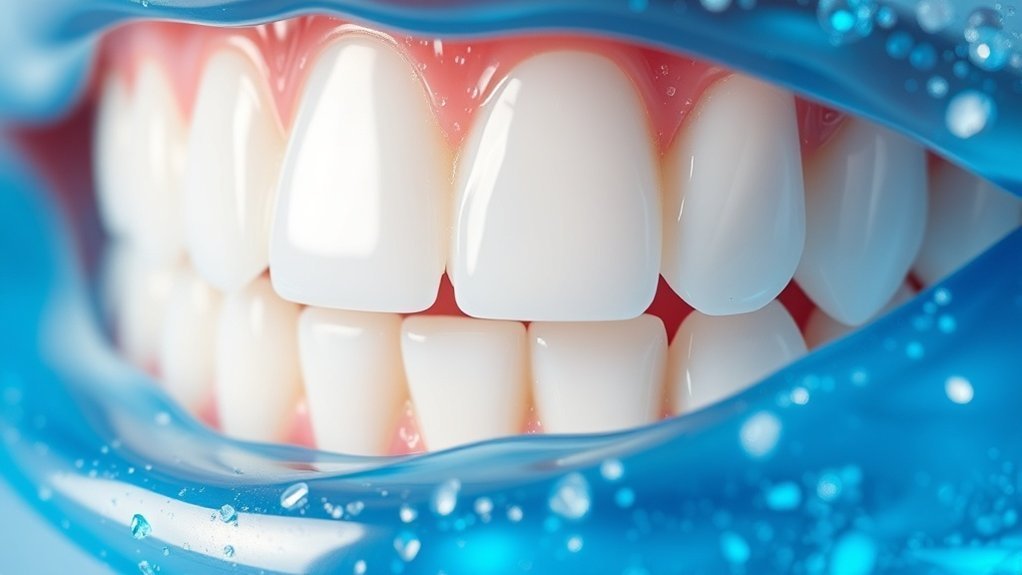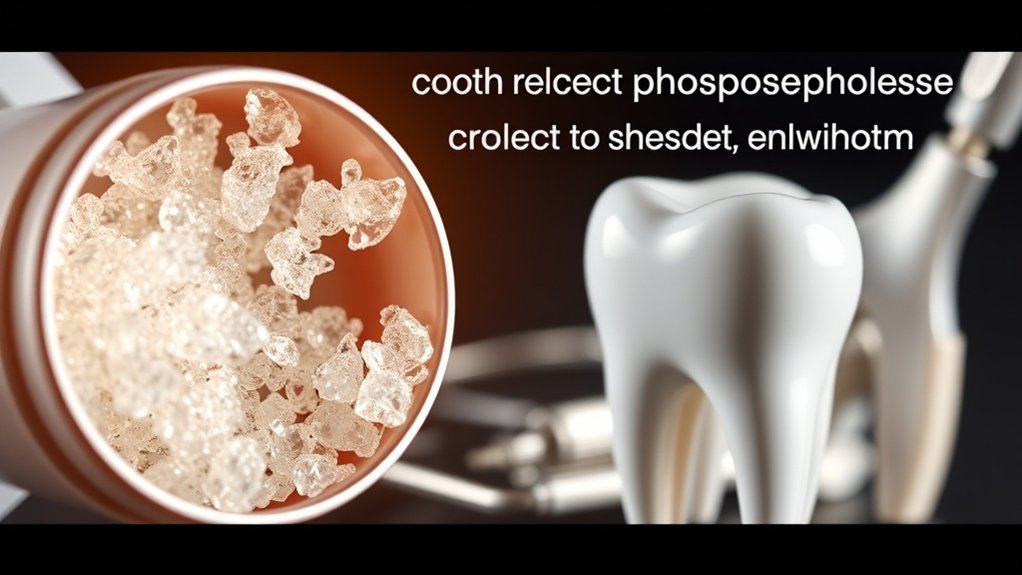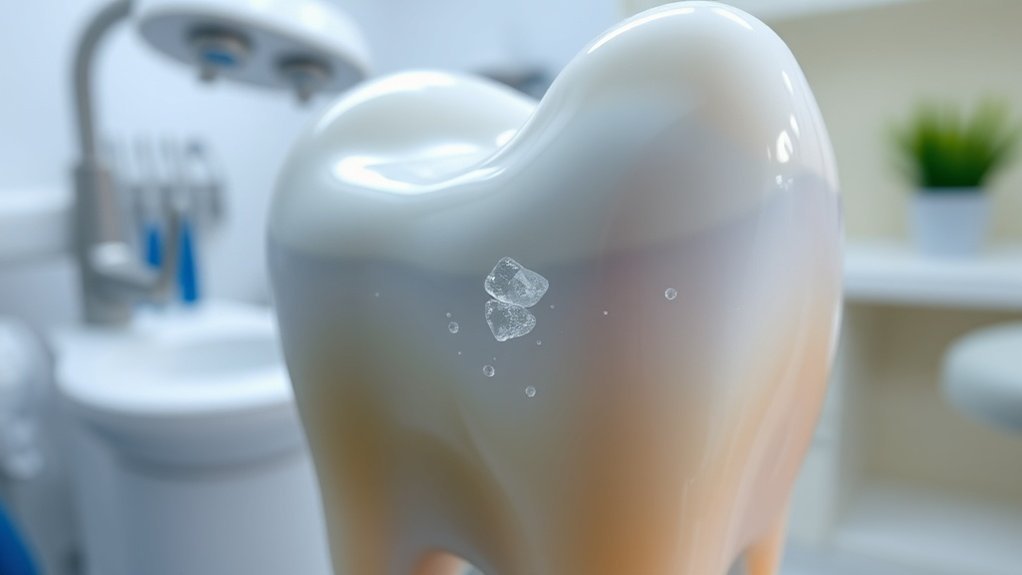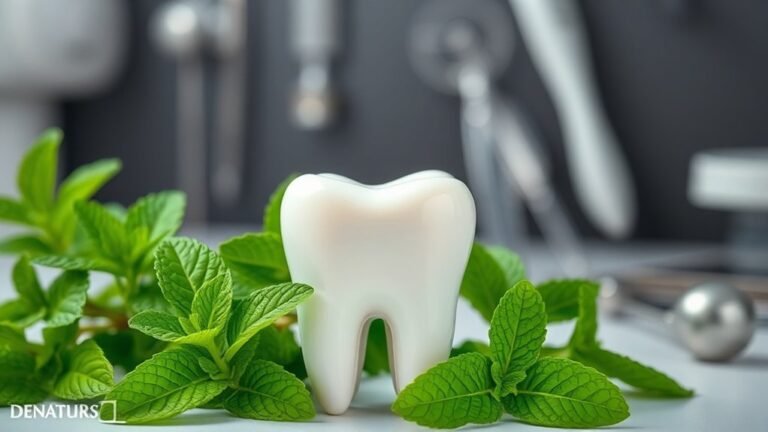Does Prodentim’s Dicalcium Phosphate Support Enamel Remineralization?
Yes, Prodentim’s dicalcium phosphate supports enamel remineralization by providing essential minerals like calcium and phosphate, which are vital for repairing acid-affected enamel. It enhances the hardness of teeth and aids in combating tooth decay effectively. Research indicates that DCP increases enamel strength and resistance to demineralization, making it a valuable ingredient in dental products. When you explore further, you’ll find additional insights on how to maximize your enamel health with effective oral care strategies.
Key Takeaways
- Prodentim contains dicalcium phosphate (DCP), an effective ingredient for enamel remineralization.
- DCP aids in delivering essential calcium and phosphate directly to enamel surfaces.
- Research indicates DCP enhances enamel hardness and resistance to demineralization.
- The inclusion of DCP in oral care products supports the repair of acid-eroded enamel.
- Regular use of DCP can contribute to long-term dental health and reduced decay risk.
Understanding Enamel and Its Importance
Enamel, the hard outer layer of your teeth, plays an essential role in oral health. It acts as a protective barrier against decay and physical wear, ensuring enamel strength is maintained. When enamel suffers from erosion due to acids or poor oral hygiene, it compromises your dental health. Understanding tooth enamel’s composition reveals its high mineral content, primarily hydroxyapatite, which is vital for its durability. Enamel repair is possible through remineralization, a process where minerals like calcium and phosphate restore lost enamel. Ensuring you support this process through diet and oral care can enhance enamel strength. Regularly consuming remineralizing agents can markedly aid in the prevention of enamel erosion and promote long-term oral health.
What Is Dicalcium Phosphate?
Dicalcium phosphate (DCP) is a calcium phosphate compound with the chemical formula CaHPO4, commonly used in dental products for its beneficial properties. It plays an essential role in dental health by aiding in the remineralization of enamel, thereby helping to combat tooth decay. Understanding its composition and function can provide insights into how it contributes to maintaining oral health.
Chemical Composition Overview
Calcium phosphate compounds play an essential role in dental health, with dicalcium phosphate (DCP) being a prominent example. This compound consists of calcium and phosphate ions in a specific ratio, which is crucial for maintaining enamel integrity. DCP not only aids in enamel remineralization but also enhances the effectiveness of fluoride treatments in dental care.
| Component | Chemical Formula | Role in Dental Health |
|---|---|---|
| Calcium | Ca²⁺ | Fundamental for enamel structure |
| Phosphate | PO₄³⁻ | Crucial for remineralization |
| Dicalcium Phosphate | CaHPO₄ | Supports enamel health |
Understanding the chemical composition of DCP allows you to appreciate its significance in promoting enamel remineralization and overall dental health.
Role in Dental Health
When it comes to maintaining ideal dental health, the presence of dicalcium phosphate (DCP) is crucial. DCP serves as a key source of dental minerals that contribute to enamel protection and tooth durability. This compound plays a significant role in remineralizing enamel, which can be eroded by acids and plaque buildup. Research shows that DCP can enhance the uptake of calcium and phosphate ions in tooth structures, leading to stronger enamel and improved resistance to decay. By incorporating DCP into your oral care routine, you can support the natural remineralization processes, ultimately promoting long-lasting dental health. Therefore, understanding DCP’s role not only helps you make informed choices about oral care products but also empowers you to maintain a healthy smile.
The Role of Dicalcium Phosphate in Dental Health
Although many substances contribute to maintaining oral health, dicalcium phosphate stands out due to its unique role in enamel remineralization. This compound acts as a source of calcium and phosphate, essential elements for reinforcing enamel structure. Research shows that dicalcium phosphate can enhance the remineralization process, effectively reversing early signs of decay and supporting overall enamel integrity. Incorporating it into your dental care routine can provide a significant boost to enamel reinforcement, making it an important component in preventing cavities. By promoting the deposition of minerals back into enamel, dicalcium phosphate directly influences your oral health. As a result, understanding its role can empower you to make informed choices for stronger, healthier teeth.
How Enamel Remineralization Works
Understanding how enamel remineralization works is essential for maintaining dental health. Enamel, primarily composed of hydroxyapatite crystals, relies on minerals like calcium and phosphate for its repair. When you consume products containing dicalcium phosphate, you provide the necessary building blocks that support this crucial remineralization process.
Enamel Structure and Composition
Enamel, the hard outer layer of your teeth, is primarily composed of hydroxyapatite, a crystalline structure that provides strength and durability. This enamel structure is rich in calcium and phosphate, which are vital for maintaining its integrity and function. When you consume oral health supplements containing these minerals, you support the potential for enamel remineralization. Enamel does not regenerate like other tissues, so its protection and restoration rely heavily on the availability of calcium and phosphate. By ensuring these minerals are present in your diet or through supplements, you can enhance your enamel’s resilience against decay. Understanding this composition underscores the importance of proper nutrition in maintaining your oral health and the effectiveness of targeted supplements.
Role of Minerals in Remineralization
Minerals play an essential role in the process of enamel remineralization, acting as the building blocks for restoring tooth integrity. When enamel erosion occurs due to acids from foods or bacteria, it loses critical minerals like calcium and phosphate. The remineralization process involves the deposition of these minerals back into the enamel structure, reversing the damage. Saliva acts as a natural reservoir of minerals, facilitating this repair. Additionally, supplements like dicalcium phosphate enhance this process by providing concentrated doses of necessary minerals. Research shows that effective remineralization can prevent further enamel erosion and improve overall dental health. Consequently, ensuring an adequate intake of these essential minerals is crucial for maintaining strong, healthy enamel.
Evidence Supporting Dicalcium Phosphate for Enamel Strength
As you explore the benefits of dicalcium phosphate in dental care, you’ll find compelling evidence supporting its role in enhancing enamel strength. Research indicates that dicalcium phosphate effectively promotes enamel remineralization, helping to reverse early signs of tooth decay. Studies demonstrate that its incorporation into dental products can markedly improve enamel hardness and resistance to demineralization. Additionally, dicalcium phosphate aids in tooth protection by delivering essential calcium and phosphate ions directly to the enamel surface, facilitating the natural remineralization process. This mineral not only strengthens existing enamel but also helps in the repair of areas affected by acid erosion. Ultimately, incorporating dicalcium phosphate into your dental regimen can contribute remarkably to maintaining strong, resilient teeth.
Prodentim: A Closer Look at Its Ingredients
While evaluating the effectiveness of dental products, it is vital to examine the specific ingredients that contribute to their benefits, and Prodentim stands out due to its unique formulation. Key ingredients like dicalcium phosphate provide important mineral support, promoting enamel remineralization. This compound works synergistically with other components in Prodentim to enhance oral health by restoring minerals lost due to acid exposure. Additionally, the product contains probiotics, which can improve the oral microbiome, further supporting enamel health. By focusing on these scientifically backed ingredients, Prodentim offers an all-encompassing approach to dental care, targeting both enamel strength and overall oral hygiene. This combination positions Prodentim as a promising option for those seeking effective enamel remineralization solutions.
Practical Tips for Enhancing Enamel Remineralization
To effectively enhance enamel remineralization, you should focus on a multi-faceted approach that includes dietary adjustments, proper oral hygiene, and the use of specific dental products. Start by incorporating calcium and phosphate-rich foods, such as dairy and leafy greens, which are essential for strong teeth. Maintain a rigorous oral hygiene routine by brushing twice daily with fluoride toothpaste and flossing regularly to prevent tooth decay. Additionally, consider using mouth rinses or products containing dicalcium phosphate, as they can further aid in remineralization. Limit acidic foods and beverages, as they can erode enamel. By adopting these strategies, you’ll not only support enamel remineralization but also contribute to long-term tooth decay prevention and overall dental health.
Frequently Asked Questions
Can Dicalcium Phosphate Cause Any Side Effects in Dental Products?
Dicalcium phosphate in dental products generally has minimal side effects. However, some individuals may experience mild irritation or allergic reactions. It’s essential to monitor your response and consult a dental professional if any adverse effects arise.
How Does Prodentim Compare to Other Enamel Remineralization Products?
Prodentim shines like a beacon among enamel remineralization products, offering effective ingredients that support tooth strength. Its formulation stands out for enhancing mineral delivery, making it a remarkable choice compared to many conventional alternatives.
Is Dicalcium Phosphate Safe for Children’s Dental Health?
Yes, dicalcium phosphate is generally safe for children’s dental health when used appropriately. It helps strengthen teeth and is often included in dental products designed for kids, ensuring effective care while minimizing any risks.
How Often Should Prodentim Be Used for Best Results?
You should use Prodentim twice daily for ideal results. Consistent use helps maintain oral health, ensuring that the active ingredients effectively support your enamel and overall dental wellness. Always follow product instructions for best outcomes.
Can Dicalcium Phosphate Help With Existing Cavities or Decay?
Dicalcium phosphate’s like a shield for your teeth; it can’t reverse existing cavities or decay, but it aids in strengthening enamel. Regular use may help prevent further damage while promoting overall oral health.
Conclusion
To sum up, dicalcium phosphate stands out as a promising agent for enamel remineralization, but the question remains: does Prodentim harness its full potential? With evidence supporting its benefits, you might wonder if incorporating it into your dental routine could truly enhance your enamel strength. As you weigh the options, consider the science behind this ingredient and how it fits into your overall dental health strategy. Will you take the leap toward better enamel protection? The choice is yours.












